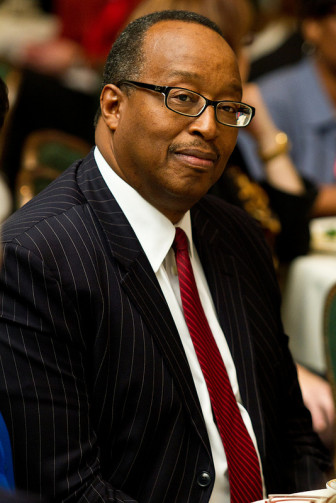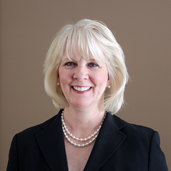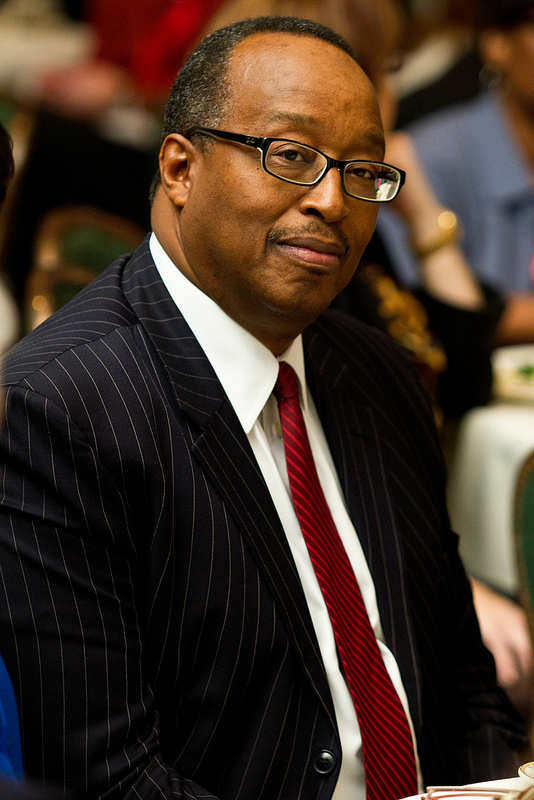
DTKindler Photo / Flikr
Robert L. Listenbee, Jr., Administrator of the Office of Juvenile Justice and Delinquency Prevention.
“I don’t need to tell you that alcohol use by young people is dangerous,” said Office of Juvenile Justice and Delinquency Prevention (OJJDP) Administrator Robert Listenbee at a webinar held this week by the Interagency Coordination Committee on the Prevention of Underage Drinking (ICCPUD.)
In a recorded message, Listenbee said alcohol is the most commonly used and abused drug in the United States, stating that it played prominently in the nation’s youth homicide, suicide and violent crime rates. He also said that underage drinking has deleterious effects on education, leads many chronic users to unemployment and underemployment and may result in individuals graduating to more potent -- and perhaps illegal -- substances.
“It takes a whole community to reinforce this agenda,” he said. To be effective in combating underage drinking, Listenbee said that officials from both law enforcement agencies and the justice system had to form partnerships with local community groups.
He also encouraged agencies like the OJJDP’S Underage Drinking Enforcement and Training Center (UDTEC) to promote “proven, science-based strategies” to reduce youth access to alcohol.
Impulsiveness, susceptibility to peer pressure and inability to evaluate long-term consequences of one’s actions remain hallmarks of adolescence, he said. With a growing body of literature demonstrating major neurological differences between the brains of young people and older people, Listenbee said it was vital that advocacy organizations never think of children as being “mini adults.”
With many agencies experiencing budget cuts, Listenbee said that programs targeting underage drinking may have to find new and creative ways “to do more with less.”
“We can do this, but it’s going to take strategic thinking,” Listenbee said.
At the OJJDP-hosted event, “Enforcing the Underage Drinking Laws: Accountability and the Role of Justice System,” Sherie Cantelon, Grant Management Specialist for OJJDP’s Youth Development, Prevention and Safety Division, served as moderator. Also speaking at the event were Shawn Walker, Director of Enforcement for the Virginia Department of Alcoholic Beverage Control (ABC); Purdue Professor and retired judge Linda Chezen; and Diane Riibe, former executive director for Nebraska’s Project Extra Mile.

Courtesy of the Virginia Department of Alcoholic Beverage Control
Shawn Walker, Director of Enforcement.
“Law Enforcement really should be focused on contributing to an enhanced quality of life in the community,” Walker said. He believes it is important for law enforcement officials to reject the notion that underage drinking isn’t a major problem for communities, stating that deterring youth alcohol use also reduces secondary offenses, like vandalism and larceny, that typically stem from underage drinking.
Simply approaching underage drinking as a law enforcement issue, Walker said, is ineffective in remedying the problem. He said agencies, especially those with limited resources, could create “force multipliers” by building partnerships with other agencies, and also encouraged law enforcement officials to work with media, which in turn, could create advocacy for the issue.
He also suggested that law enforcement agencies talk to business leaders and school officials, and stressed partnering with specialized departments to formulate action plans. Gang units, school resource officers and community service boards are especially skillful at managing limited resources, Walker said.
During her presentation, Chezen stressed the importance of providing resources for judges, and especially judicial educators, who are tasked with organizing the continuing legal education (CLE) of state and local judges.
While judicial education standards vary from state to state, Chezen said that across the nation, most judges are required to obtain CLE hours to remain on the bench. Access to emerging science regarding underage drinking, she said, is crucial for judges to continue making adequate decisions in U.S. courtrooms.
However, she also said that judicial educators should present only scientific literature -- and not advocacy views -- regarding teen and adolescent alcohol consumption.
Judicial Educators should know about screening tools and advocate for adequate resources for the education of judges and judicial staff, Chezen continued. She said that National Institute on Alcohol Abuse and Alcoholism (NIAAA) was an excellent starting place for those seeking peer-reviewed, evidence-based information on underage drinking.
As a judge, she said she considered her opportunities to learn about new sciences to be precious and well-spent.
“Justice for kids,” she concluded, “depends on the adults.”

Courtesy of CDC.gov
Diane Riibe, former Executive Director for Nebraska's Project Extra Mile.
Ribbe advocated for the establishment of .08 blood alcohol concentration measurements as federal intoxicated driving standards, and was present when Bill Clinton signed the Federal Transportation Appropriations bill into law in October 2000.
During the webinar, she encouraged a multi-issue focus on legislative initiatives, education, youth leadership and media advocacy to amplify peer support influence on policies.
In order to mirror the successes of the tobacco control movement, she said advocates needed to have a sharp focus on science-based strategies, emphasizing the most effective, evidence-driven approaches. For advocates and activists, she cited the Centers for Disease Control and Prevention’s The Community Guide as a recommended resource -- calling it “a very easy framework to identify strategies.”
She said that media advocacy could be used as a “strategic” means of building policy initiative support, which she believes could lead to long term, sustained changes regarding national alcohol policies.
“Media efforts are quite literally the ramping up of community [advocacy],” Ribbe said.
Since many individuals are concerned about underage drinking, she believes there is already fertile ground for civic engagement in most U.S. communities.
“Our job as advocates is to take this collective community care and harness it,” she said.
